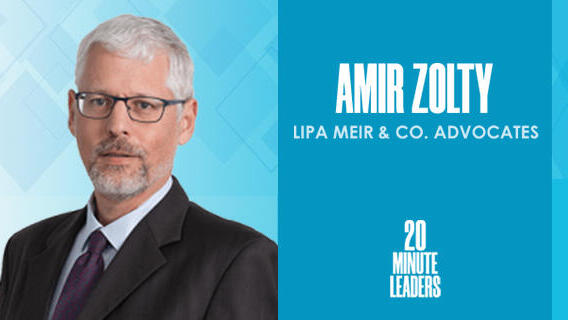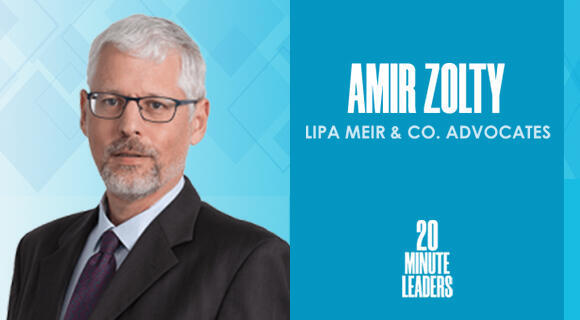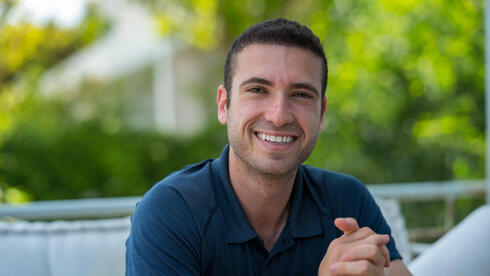
20-Minute Leaders
“Entrepreneurs should be optimistic, maybe overly optimistic.”
Doing legal work for tech companies gives head of hi-tech practice at Lipa Meir & Co Amir Zolty the chance to help build things and do more positive work, he says
Doing legal work for tech companies gives Amir Zolty the chance to help build things and do more positive work, he says. He previously worked in the public sector with the attorney general’s office and Israeli Supreme Court, and he’s glad he did, but he shares that he enjoys not being against someone all the time. As the head of hi-tech practice at Lipa Meir & Co, he gets to talk with investors and founders about new technology and ideas. Zolty then gets to walk with them through all stages of the startup. He explains he helps with setting priorities and risk management as well as sharing what he’s learned on the journey with other companies. It is thrilling to watch startups grow, Zolty says, but it is also fun to learn new legal subjects and figure out how to craft a legal solution for a new scenario.
Click Here For More 20MinuteLeaders
Amir, walk me through your legal career. How did you end up working in the tech sector?
The short answer is by chance. I I started in unit 8200, and then I got some exposure to all kinds of early-stage high-tech. In 8200, they give you the opportunity to do anything and the feeling that you can do anything, which is a great thing when you are young. Once I graduated and finished my military service, I started to learn law at Tel Aviv University. I graduated from Tel Aviv University. I was a clerk at the Israeli Supreme Court and also at a private law firm. I went to Yale to have my LLM degree.
During my study at Yale, I was amazed to see that there were so many people who were hopping between the private sector and the public sector. Until then, I had a very structured vision of being a lawyer. I started asking myself, "Why get stuck in a private law firm?" When I came back to Israel after one year, I joined the Attorney General office. It was during the early ’90s and it was a very hectic period in Israel: the Rabin administration, peace process, a lot of protests, and the murder of Yitzhak Rabin. After the murder, I was appointed as an investigator at the governmental investigation committee. It had nothing to do with law. It was more about fact finding, about interviewing witnesses.
What was that like, trying to figure out what happened in one of the most monumental events of our country's history?
It's quite complicated. The members of the committee were impressive persons. For the investigation, we interviewed all parties involved, beginning with Yigal Amir himself. We went to the jail and talked with him for about two and a half hours. It was a very moving experience.
It was a very heartbreaking experience to see both the Shabach, the GSS persons, and the police trying to struggle with the fact that, in a way, they too were responsible for such murder. They could have prevented it rather easily and they failed to do so. It was very, very sad to see these people so disappointed in themselves and then having to encounter all kinds of legal proceedings. This is really something that I'll probably remember for the rest of my life.
After that, I moved to the Supreme Court. Then I started asking, I said, "Okay, what's next?" I didn't want to just stand in line to be a judge. And I really liked the short period where I served as a lawyer in the private sector. I opened, with another partner, a boutique law firm. We focused on high-tech. It was my partner's previous career, and I decided to join him. Then we joined Lipa Meir three years ago or so.
If you are looking at the transition from the public to the private sector, what is that like?
First of all, there was a lot of stress in the public sector because almost everything was crucial and had so much importance. Most of it was rather depressing because things were very challenging.
Once you move to the private sector, it's not life and death. It's important. It's crucial. But it's not the same magnitude. Also, I felt that I'm doing many positive things. I'm not suing anybody. I'm not indicting anybody. I'm trying to help build things. You take an entrepreneur hand in hand from day one, you go with him to all rounds of investments, to his or her first commercial transactions. You are not the entrepreneur, but still you help them. You stand by them at all stages of development of such issues. You meet a lot of good people. I don't miss it. I'm very glad I spent such time with the public service, but I wouldn't like to spend all my career there.
Also, in the public sector, you meet a lot of people who are experts in their field, but they don't really know the real world. This is one of the reasons why I decided I did not want to become a judge from that position. I needed to know the world. I needed to speak with real people.
What is your work like with entrepreneurs? What is your engagement like?
I think that one of the most fascinating facets of my work is to meet with a new investor, a new entrepreneur, and hear about the new technology, ideas, and business plan. It's always amazing. My work is very close to entrepreneurs. You go with them for years and throughout all the crises, the ups and downs. So it's very important, at least for me, to have a close relationship with entrepreneurs. I can share my experience. I really enjoy the journey. It’s exciting to see a startup grow up from a toddler to a full-grown startup with tens or more than a hundred employees and then international presence.
You talk a lot about being a part of the journey; you are not talking as much about the legal work, which is obviously there. What really excites you today?
First of all, there are changes. All the time, this whole area develops and you see all kinds of new agreements. You see new types of transactions. In some cases you just have the template and fill in the names and some details. That's not really thrilling. But in many cases, I find myself word-crafting. You need to address a very complicated situation and to cover all scenarios, and you have to put it in writing. I find myself saying, "That's amazing. I never wrote this before." In many cases, the legal work is second to the thrill of a startup. But in some cases, I'm learning a new legal subject for the first time. It's still amazing.
Are there some things entrepreneurs today are doing in legal areas that you are particularly inspired by? Are there things that you observe that new entrepreneurs can look out for?
When you first meet with a team of two or three entrepreneurs, you look at them and say, "Who'll be here in one year or so?" It's so difficult to be an entrepreneur in a young startup. I really admire people who get up every day more optimistic than the other day. On my side, I'm not pessimistic, but I'm realistic. You cannot be realistic when you are an entrepreneur, when you are running a startup. These are really virtues that I admire with entrepreneurs. Having said all that, I think that the entrepreneurs should be optimistic, but should bear in mind all the downside as well. I try to help them manage the risk and behave in a manner which will keep them alive and keep them credible to their investors, to their employees, and to their whole surrounding environment.
From your legal experience, how do you observe that entrepreneurs can benefit from your background and the way that you see the world?
I help them with regard to priorities and risk management. If you are a startup which deals with personal data and you need to comply with so many legal requirements all over the globe, you don't have the resources, but you should at least start to be aware of it, start to plan when you'll do that. I'm trying to tell them what's important and what's not and what's important as of when. Many entrepreneurs are very product-oriented, development-oriented, which is fine but is not enough. So I'm trying to help them get to know other aspects as well.
Michael Matias, Forbes 30 Under 30, is a Venture Fellow at Innovation Endeavors as well as investment Venture Partner at Secret Chord and J-Ventures. He studies Artificial Intelligence and Human-Computer Interaction at Stanford University, and was an engineer at Hippo Insurance. Matias previously served as an officer in the 8200 unit. 20MinuteLeaders is a tech entrepreneurship interview series featuring one-on-one interviews with fascinating founders, innovators and thought leaders sharing their journeys and experiences.
Contributing editors: Michael Matias, Megan Ryan

